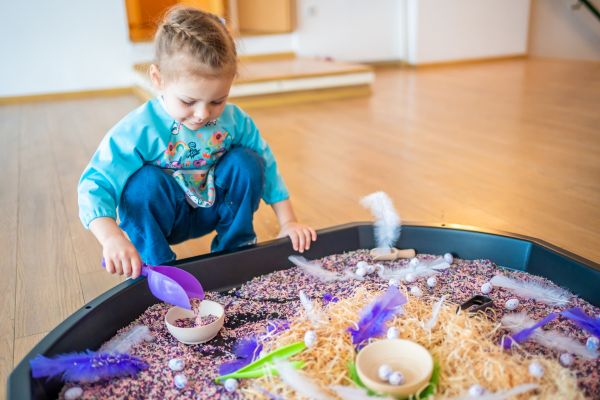There’s something magical about watching a baby’s face light up as they feel the cool grass beneath their tiny fingers or listen to the rustle of leaves in the wind. Nature play for babies isn’t just cute—it’s incredibly beneficial. It’s how little ones start making sense of the world around them, using all their senses to explore, discover, and grow.
Why Nature Play for Babies Matters
Let’s be real—babies don’t need fancy toys or high-tech gadgets to learn. They just need experiences. And nature offers endless opportunities for that. The thing is, the outdoors naturally stimulates curiosity. The sounds of chirping birds, the sight of swaying trees, and the feel of soft soil all encourage babies to explore.
Studies show that spending time outdoors helps with early brain development. Babies exposed to nature tend to be calmer, more attentive, and even sleep better. Plus, fresh air and sunlight boost their vitamin D levels, which is vital for strong bones and a healthy immune system.
So yeah, “nature play for babies” isn’t just another parenting trend—it’s a foundation for lifelong learning and well-being.
The Power of Sensory Exploration
When we talk about nature play for babies, we’re really talking about sensory play. Babies learn through touch, taste, sound, and sight. A handful of sand, a pinecone, or a puddle—each one teaches something new.
Let your baby run their fingers through blades of grass. Encourage them to listen to the chirping of birds or the buzzing of bees. Even watching clouds drift across the sky is a kind of sensory play. These experiences develop fine motor skills and hand-eye coordination naturally—no flashcards needed.
And don’t worry if your baby gets a little messy. Mud on their hands? Totally fine. Dirt on their clothes? That’s childhood magic right there.
Safe and Simple Nature Play Ideas
Now, you might be thinking, “Okay, sounds great, but how do I actually do nature play for babies?” Don’t stress. You don’t need a giant backyard or a forest nearby. Even a small park, a patch of grass, or a balcony garden can work wonders.
Start small. Lay out a blanket under a tree and let your baby feel the texture of leaves. Try filling a shallow bin with water and floating flower petals or pebbles for them to splash around with. Take stroller walks and talk to your baby about what they see—“Look at that big yellow flower!” or “Do you hear the wind?”
You can also let your baby play with safe natural objects—like smooth stones, pinecones, or seashells—while keeping a close eye on them, of course. The goal isn’t to control their play but to give them space to explore safely.
Building Connection Through Nature
Nature play for babies isn’t just good for their development—it’s a bonding experience. Sitting together in the grass, watching butterflies, or feeling the breeze on your faces—it creates a kind of calm that’s hard to find indoors.
These moments help you slow down, too. Life with a baby can feel like a blur of diapers, bottles, and naps. Stepping outside shifts the energy. Suddenly, time feels slower. You breathe a little deeper. You start noticing the tiny details your baby’s been fascinated by all along.
And here’s the sweet part: as babies grow, those outdoor moments become memories that stick. You’re not just giving them playtime—you’re giving them a lifelong appreciation for nature.
Nature Play Boosts Development in Surprising Ways
You might not realize it, but simple outdoor play builds key developmental skills. Crawling over uneven ground improves balance. Reaching for leaves strengthens coordination. Watching sunlight filter through branches builds visual tracking.
And it’s not just physical growth—there’s emotional growth, too. Nature has a calming effect that helps babies regulate their emotions. When they’re outside, they learn to adapt—to temperature changes, to different sounds, to new textures. That’s emotional resilience in its earliest form.
Even early language skills get a boost. Talking to your baby while exploring—naming colors, sounds, and objects—helps build their vocabulary naturally. It’s way more effective (and fun) than repeating words from flashcards.
How to Keep Nature Play Safe and Enjoyable
Of course, safety always comes first. Babies are naturally curious, and sometimes that curiosity involves trying to taste everything in sight. Keep a close eye to make sure nothing harmful ends up in their mouth.
Choose safe play areas—clean parks, quiet gardens, or your backyard. Avoid places with sharp sticks, litter, or pesticides. Dress your baby for the weather—hat for the sun, layers for the chill, sunscreen for extra protection.
And remember, it’s okay if things don’t go perfectly. Maybe your baby hates the grass today or gets startled by a loud bird. That’s fine. Try again another day. The beauty of nature play for babies is that it doesn’t have to follow a schedule.
Encouraging Curiosity at Every Stage
As your baby grows, nature play can evolve, too. Crawlers might love touching leaves and watching ants. Toddlers might start collecting rocks or stomping in puddles. The idea is to nurture curiosity without rushing it.
Let your baby lead. If they’re staring at a dandelion for five minutes straight, that’s perfect. That’s concentration in action. The natural world doesn’t hurry, and neither should we.
The Long-Term Benefits of Nature Play
Here’s the thing: when babies grow up with nature play, they tend to stay connected to it as kids and adults. They develop empathy for living things, respect for the environment, and a sense of wonder that lasts a lifetime.
In a world filled with screens and indoor distractions, that connection is priceless. Babies who spend time outdoors grow into children who climb trees, chase butterflies, and see the world as something worth exploring—not just scrolling through.
Wrapping It All Up
Nature play for babies is one of the simplest yet most powerful gifts you can offer. It doesn’t cost anything. It doesn’t require fancy gear. Just you, your baby, and the world outside.
So next time the weather’s nice, grab a blanket, head out, and let your little one explore. Feel the breeze, watch the clouds, listen to the rustling leaves. Because those tiny moments—the laughter, the discoveries, the muddy hands—are what childhood is all about.
At the end of the day, nature play for babies isn’t just play. It’s life unfolding in the most natural, beautiful way possible.



